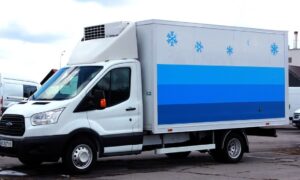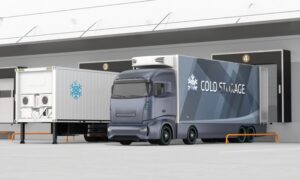The Indian cold supply chain industry faces significant challenges, such as inefficient temperature control and inadequate technology integration, resulting in food losses and reduced market access for farmers. However, digital solutions like IoT, AI, and ML can be adopted to address these issues, says Swarup Bose, Founder and CEO of Celcius.
What are the challenges facing the Indian cold supply chain industry, and how are digital solutions such as IoT, AI, and ML being used to address them?
The Indian cold supply chain industry is rapidly developing, especially posts Covid, and has huge growth potential. In 2021, the Indian cold chain logistics market was valued at $ 24.62 billion, and it is expected to reach $53.07 Billion by 2027, growing at a CAGR of 13.66% from 2021 to 2027. The cold supply chain sector in India is highly fragmented and marred with sever challenges including inefficient temperature control and monitoring and inadequate tech integration. To face the challenges, I had to had to adopt to digital development like:
Internet of Things (IoT), can potentially transform cold chains forever. By integrating IoT solutions into cold supply chains, our platform can consistently stay on top of every step in the storage and transportation processes, catalyzing significant cost-optimizing benefits. Artificial Intelligence (AI)and Machine Learning (ML) are helping provide end-to-end visibility into every cold chain function by processing massive volumes of live data. Data and predictive analysis can help address challenges in inventory management, stock control, quality testing, and pricing while also minimizing human error.
How does Celcius address the traditional challenges of booking refrigerated vehicles in India, and what features does its platform offer users?
Booking reefer vehicles across India has always been a big pain point, there is no direct visibility on the availability of such vehicles, CELCIUS is the only platform having a web-based and android based app which allows for discovery and booking of various sizes of refrigerated vehicles across India, it’s not limited to only booking but you can track, trace, receive data analytic, download reports and finish you transaction by making payments, this brings the age old system of booking such vehicles via broker and agents onto the new age of digital adoption.
What are the main challenges in the cold supply chain that lead to food losses, and how can a strategically planned cold storage and transport facility help solve these issues?
As a nation, we currently incur food losses worth about $14bn, most of which are post-harvest losses, due to inefficiencies in its cold supply chain. Challenges like lack of temperature monitoring in cold storages, using non-refrigerated vehicles for last mile transport or for shorter distances, lack of tracking and tracing technology to monitor distribution, lack of reefer vehicles, and inaccurate handling of products with untrained drivers and delivery agents, and many other issues in terms of managing perishables. Shippers also incur heavy revenue losses due to systemic gaps in the cold chain. The lack of affordable cold storage and cold transport facilities is another common challenge faced by rural farmers and food producers. Since fresh produce has a limited shelf life, farmers with no access to refrigerated storage are forced to sell their harvest at lower costs, to avoid wastage. This leads to financial losses and also reduces their access to wider markets.
A strategically planned cold storage and cold transport facility can help solve several wastage problems and help fight hunger while also benefiting farmers. Effective temperature-controlled storage has been known to not only prevent fresh produce from going waste but also enhances its shelf life. With a smart warehouse management system that is integrated with a digital cold chain platform, it is possible to supervise and ensure real-time updates and modification, so as to maintain optimum temperatures throughout the storage and transport process for perishable goods. Additionally, with the help of a robust cold storage and cold supply infrastructure, farmers can explore several high cash-yielding options like fruits and exotic vegetables, which offer them better revenues.
What technologies and methods can be used to build a seamless and transparent cold supply chain network?
Through effective integration of AI, ML, IoT and Data-driven insights on a single platform, it is possible to build a seamless cold supply chain network that allows complete transparency and real-time tracking. Integration also offers 360° visibility into cold chain fleets, including KPIs such as capacity utilization, driving speed, and idling times. Blockchain is also fast catching up as a preferred tech adoption for cold supply chain companies, as it offers a transparent and secure platform to manage and track inventory as it moves through the supply chain. And smart, digitally programmed contracts automatically enact or document relevant events when specific terms are met, offering a way for supply chain stakeholders to collaborate and share information (and money) more efficiently.
How is India working to reduce logistics costs and improve sustainability through technology in last-mile delivery and inventory management?
As one of the fastest growing economies with a focused thrust on logistics and supply chain infrastructure development, India has been working towards reducing its logistics costs. It is also bringing in innovative tech enabled solutions and greener practices that meet the international norms of sustainability. Some of the industry firsts that are currently shaping the sector, include:
Real-time tracking and monitoring: Through effective tech integration on a single platform, it is possible to monitor temperature, track and trace movement of cargo across the last mile delivery routes, in real time.
Smarter inventory management is also enabled by this technology, as it provides data-driven insights into the quality of perishables both on-site and in transit, resulting in reduced errors and higher revenue. By optimising last-mile deliveries through tech-driven solutions, logistic service providers can increase operational efficiencies and improve profit margins while reducing liabilities and penalties. Overall, this approach can make the process both operationally and economically rewarding. Also, as an industry leader in cold supply chain tech solutions, We at Celcius have also introduced the first of its kind Hyper-Local temperature-controlled delivery services for food and pharma orders, as part of its last mile solution. Celcius has also currently tied up with Zomato and is their partner of choice for temperature controlled deliveries across varies cities for their inter-city orders. In the long run, Celcius also aims to cater to fruits and vegetable suppliers, direct-to-home services, pharma products and intermediary distributors, vaccine distributors as well as cloud kitchens, canned food companies, dairy and meat distributors, among others, who would need temperature-controlled deliveries to be made for quantities ranging from 500gms to 100 kg in a single consignment. Multiple consignments can be booked too for higher quantities.
Can a holistic approach to creating a robust, tech-enabled, and seamless cold supply chain help solve the challenges faced in the industry?
There is certainly a lot of room for improvement; however, all the above problems can truly be solved only when there is holistic approach to creating a robust, tech-enabled, and seamless cold supply chain that offers a truly unbroken solution from source to the end consumer. And while the government’s National Logistics Policy represents a number of positive steps in the direction, a lot of the work also remains to be done through public-private partnerships and organisational initiatives, which, when put into practice, will aid in closing the gaps. Access to financial aid for investments in technology solutions for cold chain, is another area which can help service providers build a stronger infrastructure while upskilling drivers and warehouse staff for handling perishables in a temperature-controlled environment, are other areas that can help create an efficient and seamless cold supply chain.
Cookie Consent
We use cookies to personalize your experience. By continuing to visit this website you agree to our Terms & Conditions, Privacy Policy and Cookie Policy.















